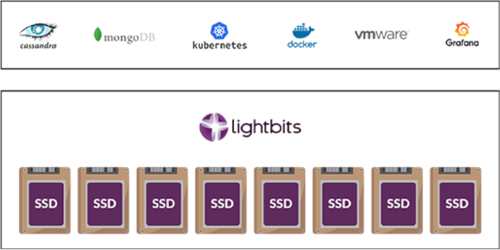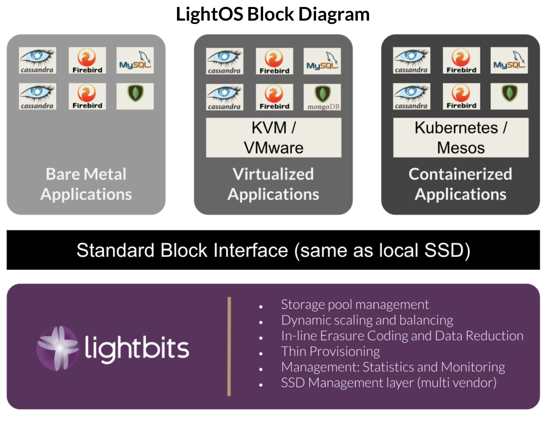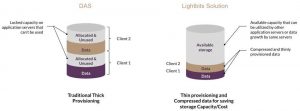Lightbits LightOS Delivers NVMe/TCP Clustered Storage Solution
Protects vs. data loss and avoids service interruptions at scale, and maximizes operational efficiency, ensuring applications continue working in presence of failures, and failover is handled automatically, keeping data consistent and available.
This is a Press Release edited by StorageNewsletter.com on December 20, 2019 at 1:09 pmLightbits Labs has advanced its software solution, LightOS, to deliver a NVMe/TCP clustered storage solution.
With more companies moving away from DAS, and with storage requirements typically growing far faster than compute requirements, both public-cloud providers and private-cloud builders are looking for ways to separate storage and compute so each can scale separately. One of the limiting factors to scaling disaggregated storage, however, is the need for HA across clusters of storage and compute. LightOS delivers the availability, flexibility and efficiency of hyperscale cloud infrastructure to on-premise data centers.
IT is the first NVMe/TCP storage solution that protects vs. data loss and avoids service interruptions at scale. In the presence of server, storage, or network failures, it maximizes operational efficiency, ensuring applications continue working in the presence of failures, and failover is handled automatically, keeping data consistent and available.
The average cost of IT downtime is enormous. According to Gartner, the average loss is $5,600 per minute. This can add up to more than half a million dollar lost per hour at the higher end.
“At cloud scale, everything fails, so we built LightOS to capture all the benefits of disaggregated storage while providing exceptional durability and availability to prevent service disruption,” said Kam Eshghi, chief strategy officer, Lightbits Labs.
For cloud-native applications, access to available, performant and easily deployable infrastructure is key to business agility and application experience, at any scale – regardless of whether you deploy 5 nodes, 500 nodes, or 1000 of nodes.

Installed on commodity servers in large-scale data centers, LightOS is optimized for I/O intensive compute clusters, such as Cassandra, MySQL, MongoDB, and time series databases. With end-to-end NVMe, it delivers performance and consistently low latency. The result is a 10X increase in storage reliability and 50% decrease in TCO.
As a standard-based, target-only solution that does not require installing any proprietary software on the client side, the ease of deployment at scale is unmatched. LightOS is built to run in existing data centers, requiring no changes to application servers or network infrastructure, so that deploying it at scale is a breeze.
As LightOS provides available, flexible, and disaggregated storage, application teams can focus their efforts on developing new services to achieve their business goals, while lowering spend and delivering performance.
Click to enlarge
LightOS provides following additional benefits:
-
Software-defined disaggregated storage for cloud data centers delivering similar performance as direct-attached NVMe SSDs and up to a 50% reduction in tail latency.
-
Independent scaling of storage and compute, driving better infrastructure utilization and efficiency and providing unparalleled flexibility.
-
Standards-based NVMe/TCP block storage access protocol for application servers to storage servers communication.
-
LightOS clusters leverage standard NVMe 1.4 multipathing and offers data replications on storage target side, which provides transparency to the client with quick failover.
-
Distributed and durable cluster management with fast failover handling.
-
No single point of failure in data and control paths.
-
Multiple LightOS clusters can exist in the same cloud data center and can be aggregated and managed as one large cloud-scale block storage solution.
Resources:
Deploying Reliable High Performance Storage with LightOS (registration required)
Video: Meet Lightbits: Separation without Drama
Read also:
VMworld: Lightbits Labs Demonstrated How LightOS Solution Working With VMware vSAN
NVMe/TCP brings disaggregation to VMware vSAN HCI, scales storage and compute independently.
September 3, 2019 | Press Release
















 Subscribe to our free daily newsletter
Subscribe to our free daily newsletter

